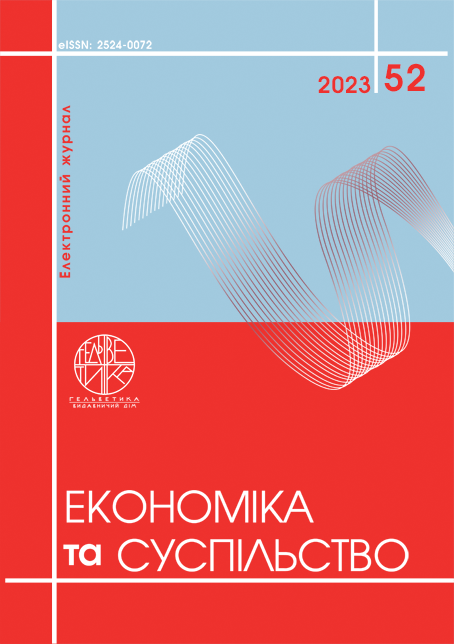ВПЛИВ ЗМІНИ ПОКОЛІНЬ ПЕРСОНАЛУ НА ОРГАНІЗАЦІЙНУ КУЛЬТУРУ КОМПАНІЇ
Анотація
Наразі керівництво багатьох українських компаній зіткнулося з проблемою зміни поколінь у структурі персоналу компаній, при цьому важливо враховувати і вплив війни в Україні, який впливає на психологічний стан персоналу компаній. Тому перед керівництвом компаній постає проблема створення комфортного психологічного клімату та адаптації організаційної культури до нових реалій та нового складу персоналу. Так, покоління бебі-бумерів у зв'язку з віком поступово виходить на пенсію, а покоління міленіалів все більше вливається до складу робочої сили українських компаній, також активно починає зростати і дорослішати покоління Z. Такі зміни у складі персоналу компаній призводить до необхідності адаптації організаційної культури компаній до цінностей, важливих для представників саме цих поколінь. Людей одного покоління об'єднує як економічний чи соціальний контекст. Кожне покоління має свою сформовану систему пріоритетів і особистих поглядів життя, вироблена під впливом безлічі навколишніх чинників епохи, причому зміна цих цінностей періодично повторюється. На даний момент в Україні у складі робочої сили задіяні представники чотирьох поколінь: бебі-бумерів, покоління Х, міленіалів та покоління Z. Проте бебі-бумери йдуть на пенсію, а покоління міленіалів та покоління Z розпочинають свою трудову діяльність. Однак, покоління бебі-бумерів поступово за віком виходить на пенсію, а представники покоління Z це здебільшого ще діти та підлітки, тому ще складно повністю дослідити особливості цього покоління. В результаті дослідження систематизовано основні конкурентні переваги представників поколінь Х та міленіалів, які на даний момент є ключовими як співробітники українських компаній. Також виділено і цінності організаційної культури, які важливі для представників покоління, для того, щоб утримати співробітника у колективі та отримати від нього максимальний результат.
Посилання
Arefieva, O. V. & Arefiev, S. O. (2020). Upravlinnia orhanizatsiinoiu kulturoiu ta rozvytkom yak osnova stabilnoi diialnosti pidpryiemstva. [Management of organizational culture and development as a basis for stable enterprise activity]. Ekonomichnyi visnyk – Economic Herald, 3, 109–117. DOI: https://doi.org/10.33271/ebdut/71.109 [in Ukrainian]
Blyznyuk, T. P. (2018). Tsinnisnyi profil pokolinnia bebi-bumeriv, pokolin Kh ta Y v Ukraini. [Value profile of the generation of baby boomers, generations X and Y in Ukraine]. Derzhava ta rehiony. Seriia: Ekonomika ta pidpryiemnytstvo – State and regions. Series: Economy and entrepreneurship, 3 (102), 59–65. Available at: http://nbuv.gov.ua/UJRN/drep_2018_3_11 [in Ukrainian]
Kashchuk, K. M. (2018). Osoblyvosti upravlinnia spivrobitnykamy X, Y ta Z pokolin. [Peculiarities of managing employees of the X, Y and Z generations]. Ekonomika. Upravlinnia. Innovatsii. Seriia: Ekonomichni nauky – Economy. Management. Innovations. Series: Economic Sciences, 1. Available at: http://nbuv.gov.ua/UJRN/eui_2018_1_9 [in Ukrainian]
Rynkevych, N. S. (2020). Transformatsiia orhanizatsiinoi kultury pidpryiemstv v umovakh modernizatsii. [Transformation of organizational culture of enterprises in the conditions of modernization]. Candidate’s thesis. Kyiv. [in Ukrainian]
Strutynska, O. V. (2020). Osoblyvosti suchasnoho pokolinnia uchniv i studentiv v umovakh rozvytku tsyfrovoho suspilstva. [Features of the modern generation of pupils and students in the conditions of the development of a digital society]. Vidkryte osvitnie E-seredovyshche suchasnoho universytetu – The open educational E-environment of a modern university, 9, 145–160. Available at: http://nbuv.gov.ua/UJRN/oeeemu_2020_9_14 [in Ukrainian]
Kharchyshyna, O. V. (2007). Kontseptsiia orhanizatsiinoi kultury pidpryiemstv: retrospektyvnyi analiz ta pespektyvy praktychnoho zastosuvannia. [The concept of organizational culture of enterprises: retrospective analysis and prospects of practical application]. Visnyk Derzhavnoho ahroekolohichnoho universytetu. – Bulletin of the State Agroecological University, 2, 202–208. [in Ukrainian]
Blyznyuk, T. &Maistrenko, O. (2023). Conflict of Ukrainian Generations X and Y: Ways to overcome it in the context of the war in Ukraine. Social and Legal Studios, 6 (1), 9–16.
Denison, D. R. (1990). Corporate culture and organizational effectiveness. New York : John Wiley & Sons, Inc.
Jemima, R.T.N. & Kusumadmo, E. (2019). Identifying strategies to minimize intergenerational conflict in workplace. KINERJA, 23(1), 67–75.
Hofstede, G., Hofstede, G. J. & Minkov, M. (2010). Cultures and Organizations: Software for the Mind. New York : McGraw-Hill.
Howe, N. & Strauss, W. (2007). The Next 20 years: how customer and workforce attitudes will evolve. Harvard Business Review. July-August, 41–52.
Schein, E. (1999). The corporate culture survival guide. San Francisco, CA : Jossey-Bass.
Singh, V., Verma, S. & Chaurasia, S. (2020). Intellectual structure of multigenerational workforce and contextualizing work values across generations: multistage analysis. International Journal of Manpower, 42, 470–487.
Ареф’єва О. В., Ареф’єв С. О. Управління організаційною культурою та розвитком як основа стабільної діяльності підприємства. Економічний вісник. 2020. №3. С. 109–117.
Близнюк Т. П. Ціннісний профіль покоління бебі-бумерів, поколінь Х та У в Україні. Держава та регіони. Серія: Економіка та підприємництво. 2018. № 3 (102). С. 59–65.
Кащук К. М. Особливості управління співробітниками X, Y та Z поколінь. Економіка. Управління. Інновації. Серія: Економічні науки. 2018. Вип. 1. URL: http://nbuv.gov.ua/UJRN/eui_2018_1_9
Ринкевич Н. С. Трансформація організаційної культури підприємств в умовах модернізації : дис… канд. екон. наук: спец. 08.00.04; Інститут економіки промисловості НАН України. Київ, 2020. 326 c.
Струтинська О. В. Особливості сучасного покоління учнів і студентів в умовах розвитку цифрового суспільства. Відкрите освітнє Е-середовище сучасного університету. 2020. № 9. С. 145–160.
Харчишина О. В. Концепція організаційної культури підприємств: ретроспективний аналіз та перспективи практичного застосування. Вісник Державного агроекологічного університету. 2007. № 2. С. 202–208.
Blyznyuk T., Maistrenko O. Conflict of Ukrainian Generations X and Y: Ways to overcome it in the context of the war in Ukraine. Social and Legal Studios. 2023. № 6 (1). P. 9–16.
Denison D. R. Corporate culture and organizational effectiveness. New York: John Wiley & Sons Inc., 1990. 267 p.
Jemima R.T.N., Kusumadmo E. Identifying strategies to minimize intergenerational conflict in workplace. KINERJA. 2019. № 23(1). P. 67–75.
Hofstede G., Hofstede G. J., Minkov M. Cultures and Organizations: Software for the Mind. New York: McGraw-Hill, 2010. 560 р.
Howe N., Strauss W. The Next 20 years: how customer and workforce attitudes will evolve. Harvard Business Review. 2007. July-August. P. 41–52.
Schein E. The corporate culture survival guide. San Francisco, CA: Jossey-Bass, 1999. 346 р.
Singh V., Verma S., Chaurasia S. Intellectual structure of multigenerational workforce and contextualizing work values across generations: multistage analysis. International Journal of Manpower. 2020. № 42. P. 470–487.

Ця робота ліцензується відповідно до Creative Commons Attribution 4.0 International License.


